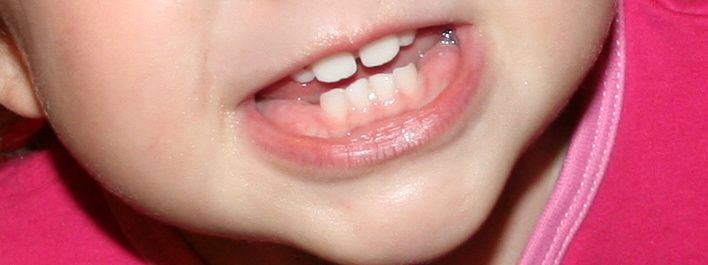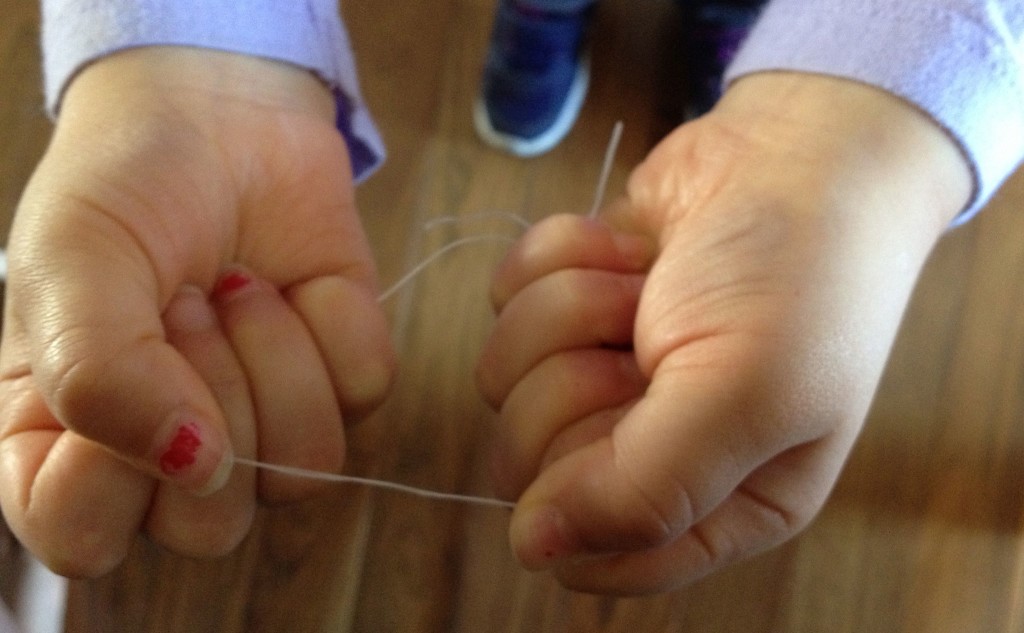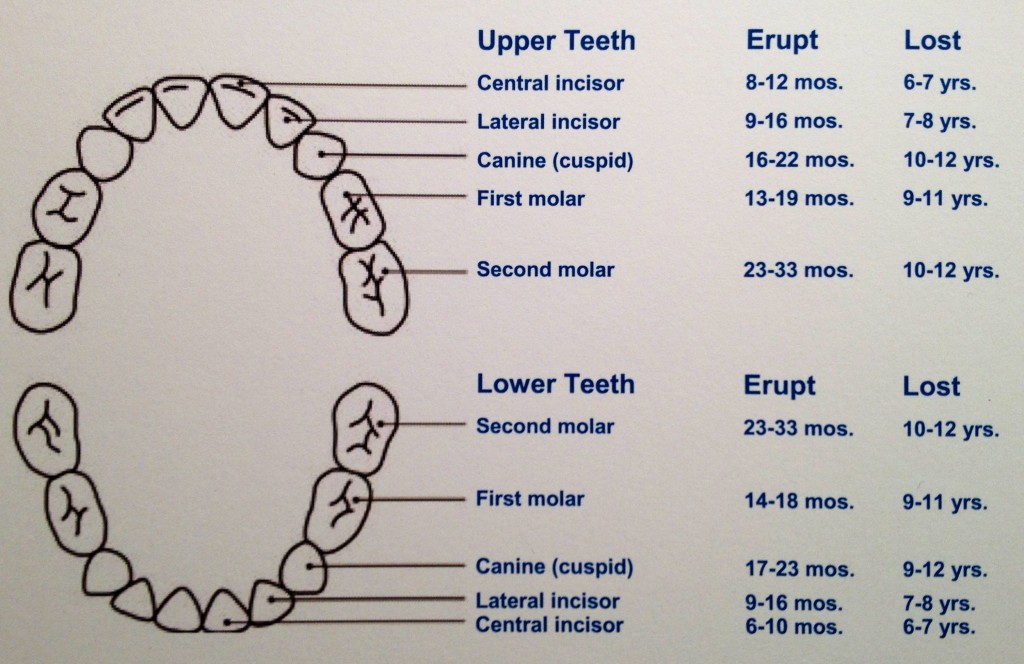Mommy Dentist
 Although this site is about food, you know I’ve got a thing for teeth right? So here it is, the moment you’ve all been waiting for. Just what the doctor prescribes in terms that make sense based on the most common questions I get asked or the questions that should be asked but are not.
Although this site is about food, you know I’ve got a thing for teeth right? So here it is, the moment you’ve all been waiting for. Just what the doctor prescribes in terms that make sense based on the most common questions I get asked or the questions that should be asked but are not.
How old should my child be before I take them to the dentist?
I recommend seeing your dentist either shortly after the first teeth erupt or around the age of one. You know those “baby wellness visits” you have with the pediatrician? Well consider this first visit to be the “Dental Baby Wellness Check”. Your dentist probably won’t spend a long time looking in your babies mouth as there isn’t too much to see, but consider that a good thing at this point. Having said that, they will want to take a look all over to make sure everything is progressing as it should and that there is nothing particularly unusual going on. Most of the time will likely be spent talking about how you can set your child up for success & ensuring healthy gums and teeth from the start. You know my motto, “Healthy Habits From The Start”.
When should I start brushing my kids teeth?
You should actually start this healthy habit of brushing gums before the teeth actually come in. Cleaning the gums & tongue of a newborn infant with a clean, soft wash cloth on a regular basis not only removes a coating that milk and bacteria can form, but also stimulates the gums and improves their health & strength to resist breaks in skin & thus infection. It also helps baby get use to this sensation of tooth brushing.
The kind of bacteria that cause cavities don’t pose much of a problem until teeth actually come into the mouth because its only at this point that they have a hard surface to adhere to that doesn’t slough like skin cells do. These particular bacteria are actually passed to baby from an outside source; they are not born with them. This outside source is usually from parents (kissing baby, parents cleaning off babies soother by putting it into their own mouths, or sharing a cup, straw or spoon, etc.). Now I’m not saying don’t kiss your baby, but I will recommend that the first thing you can do to help your baby have good oral health is to make sure YOU have good oral health. If you have lots of cavities that have not been dealt with and poor oral hygiene, the bacterial load that you share is going to be much greater than a parent who is in tip top shape orally. Also, just because you have dentures, doesn’t mean you can forget to brush your childs teeth. Believe it or not, this is an issue!
So lets take a quick detour and talk about: What exactly is a cavity and how do you get them?
I’m going to share with you the version I give to most kids including my daughter who asked me this just tonight! (Oh and this really impresses the teenage girls too J).
“So there are these little bacteria that live if your mouth and I call them “SUGAR BUGS” because they LOVE SUGAR! These little bugs live on your teeth and any time you eat something that has sugar in it (and that’s a lot of things, including healthy and especially not so healthy foods), they want to eat that sugar too. These sugar bugs are so small that you can’t see them, but when you don’t brush your teeth, these little bugs get together with all of their sugar bug friends and form what’s called a plaque. There are so many sugar bugs in this plaque you can actually start to see them on your teeth, it usually looks like a white or yellow slime, YUCK. Anyways, also when you don’t brush your teeth, the sugar that you eat sticks to your teeth & gets caught on and in between them so this group of sugar bug friends decide to have a PARTY and eat all the sugar you left there for them. Just like you though, sugar bugs also have to go to the bathroom some times, so after they eat the sugar, that’s exactly what they do. That’s right, they POOP ON YOUR TEETH. The sugar bugs actually poop acid that can eat away at your teeth creating holes and tunnels through which the sugar bugs can travel to have more parties in different places. At first you won’t notice the holes because your teeth don’t hurt but eventually it will get so deep into your tooth that your tooth starts to hurt. Toothaches are NO FUN!
This is why it’s so important to brush your teeth AND FLOSS to get rid of the sugar and the sugar bugs that eat it!
How old before I can stop brushing my kids teeth for them?
There should be a top 10 list of things you shouldn’t say to your dentist. One of which is that my 4 year old daughter doesn’t brush her teeth and when she does she doesn’t do a very good job and that’s why she has cavities! You are absolutely right, she doesn’t do a good enough job and that is exactly why I recommend that parents help their kids brush and floss their teeth until somewhere around the time that they can “hand right their name legibly or tie their shoe” (I will probably do it longer than that myself) because they physically do not have the manual dexterity to get everywhere that they need to get, nor do they fully comprehend the importance of the act. Please do not give your 4 year old a lecture in the dental chair because they didn’t brush properly and now they have cavities. It’s not their fault J
How long and how do I properly brush my kids teeth?
Obviously the more teeth they have the longer it’s going to take, but for a full mouth your looking at somewhere around two minutes to brush and another two minutes to floss. Since we recommend brushing at least twice and flossing once a day that means only 6 minutes a day can save you thousands and thousands of dollars tomorrow. A lot of people don’t realize that brushing the area where the gums and the teeth meet is just as important as brushing the biting surface of the teeth because that is where a lot of the bacteria collect. Many people will shy away from this area if it starts to bleed thinking that they are doing a bad thing but in fact this only means that the gums have not been properly stimulated and need to be brushed more. The more you brush the less it will bleed. So brush the biting surfaces but also brush the insides and the outsides of the teeth holding the tooth brush at a 45 degree angle toward the gums and use a small circular or gentle back and forth motion a few times, then swipe towards the biting surface of the tooth. Go around and make sure you haven’t missed any teeth. Also be sure not to miss behind the backs of the front bottom teeth. Also don’t forget to brush their tongue. All those grooves in their tongue are the perfect place for bacteria and small food bits to collect contributing to halitosis or in other words bad breath!
How often should I brush & floss my kids teeth?
As mentioned earlier, you should brush their teeth at least twice a day; morning and night. As a parent myself I know it’s hard to get that morning brushing in as that usually seems to be the most rushed time of the day but it really is important and best to do after they have eaten breakfast. Then of course at night before bed is also a must. At this time I usually tell parents to make sure the kids are done eating for the night and then brush the teeth because the rule is, after the night time brushing, just water to drink. Even milk has sugar in it and can cause cavities. As for flossing this should be done at least once a day and more if obviously necessary.
What about putting them to bed with a bottle?
I have the unique but unfortunate opportunity of doing dental work on young children (some times as young as one and two years old,) who have severe dental decay, while they are asleep under general anesthesia in a hospital like setting. The cause of this severe dental decay many times is because a parent will put their child to bed with a bottle of milk or even worse juice. Like I said earlier, even milk has sugar in it in the form of lactose and this can cause dental decay. When little ones are put to sleep with a bottle, the milk continues to leak out of the nipple and pools in their mouths and if not cleaned off will form cavities. How many parents feel comfortable with their child being put to sleep at that young age? Not many but sometimes it’s a must…and sometimes its so bad that the only thing that can be done is to pull their teeth out which risks complications down the road.
What about breastfeeding?
Breastfeeding in my opinion is best but it again, still contains sugar. So be careful. Once baby has finished be sure to unlatch (especially if you co- sleep with your baby) and even better, if baby will stay sleeping gently wipe with a cloth those little tiny teeth after nursing. Take some comfort in the fact that breast milk has antibacterial properties but if a child is aloud to nurse all night long when teeth are present, and the teeth are not brushed & flossed at the appropriate times, you run the risk of decay developing just as you would if using a bottle. I breast feed my babies and fortunately did not have a problem but as you can imagine, I am a very diligent toothbrusher and flosser.
Do I really need to floss my kids teeth?
Absolutely YES! The toothbrush cannot possibly get all the way in between the teeth and that is where a lot of little food bits get caught. So many parents come into the office and because they can’t see a cavity are shocked when I tell them that their child has eight! How is this so? Well it’s because the cavities are in between the teeth so you can’t see them without a radiograph (x-ray). This is why flossing is so important. Those little cavities will sneak up on you if your not flossing and they start out small but can have devastating consequences. A wise dentist mentor/friend of mine always says, “You floss the teeth you want to keep!” Now flossing does not mean just going in between the teeth and back out again. Flossing involves two tooth surfaces and the gums. Make sure that once you’ve got the floss through the teeth contacts that you shape it around the one tooth surface like a “C” or arc and then slide it up and down going in between the tooth and the gums and then do the same thing to the other tooth surface on the other side. Then if it’s to hard to pull the floss up through the teeth again, just pull it very gently out the side and move on to the next contact. I use to tell people to just floss anywhere where the teeth contact but I now encourage parents to floss both sides of all teeth even if they don’t contact and not to forget behind the back tooth or molar. It might seem like over kill but it helps the child to get use to it and remember you are also cleaning between the tooth and the gums, not just the teeth.
A few flossing tips:
- If you are flossing for your kids or brushing for that matter, the best position is to be behind your kids with them in your lap or behind them at the sink with their head tilted back. Just like if you were the dentist. You have much better visibility and much better control than trying to stand in front of them.

- If you are teaching your children to floss for themselves, the usual method for flossing can be somewhat cumbersome for them (which is: wrapping the floss around your middle finger on one hand, then again on the middle finger on your other hand and then manipulating the floss with your pointer fingers and thumbs). So instead, I have the parents tie the floss in a small to medium sized circle so that the child can grasp the floss with all the fingers like holding a steering wheel and then they can practice without cutting the circulation off in their little fingers and without the floss slipping out or unraveling. They just seem to have a little better control that way.
- Flossing picks, yes they are great, and yes they are convenient so better than nothing, but I still prefer regular floss as it can be wrapped or arched around the tooth more effectively.
- If you see bleeding, it doesn’t mean to stop flossing. In fact it’s usually just the opposite. The bleeding is the body’s quick response to unhealthy and inflamed gum tissue (think of it as an over reaction because it’s been neglected for so long that it doesn’t know that what you are doing is a good thing). The more you floss the less it will bleed and the gums will get healthier and stronger to fend off bacterial insults. The only other reason they might bleed is if you are being a bit too aggressive. You don’t need to apply a lot of pressure and probably shouldn’t as this can damage the gum tissue.
What foods cause cavities?
Like we discussed earlier, foods that contain sugar cause cavities be it healthy or unhealthy. Milk contains sugar, fruits & vegetables contain sugar, breads and grains contain sugar and of course the most obvious are candy bars, chips, pops and juices. Particularly dangerous are sticky sugary foods like fruit snacks and granola bars which seem to be a go to favorite for lunches and snacks. These sticky little rascals are known for getting stuck in the deep grooves of the teeth and are difficult to get out or to wash away by swallowing. In addition, because you are actually here reading my blog, you probably are at least on the verge of removing a lot of those unhealthy snacks from your kids diets and replacing them with better alternatives so I will also warn that even dried fruit like raisins and dried mangos have sugar in them and are very sticky, so be smart about how much of them you let your kids snack on and be conscious of brushing teeth immediately or soon after an insult like that.
Juice as healthy as it may be if fresh squeezed from an apple or other yummy fruit is also full of sugar without the fiber so for your child’s sake, and for the sake of their teeth, if you are going to give it to them, limit the amount of fruit juices to around one cup a day and at one sitting. Don’t let them sip it all day long. (Green juices or smoothies are not quite as taxing).
Is pop really that bad?
I know you all know the answer to this but I just wanted to make it clear that in addition to all the negatives of too much sugar, caffeine and carbonation, soda pops such as Pepsi and Coke are VERY ACIDIC and can burn holes through your teeth just like bacteria but at an exponential rate. The worst part is when you tell a 17 year old that he now needs crowns on every tooth in his mouth in order to save them because the classic pattern of decay is in the form of a ring around the tooth, (kind of like eating only the middle out of an apple all the way around,) and the only way to fix that is with crowns that get very expensive. (Between 800 – 1500 dollars a tooth… I’ll let you do the math.) The only thing worse than this is telling the same kid that because he couldn’t afford the crowns and didn’t come back to have treatment for another year, now he’s going to have to have all those teeth removed and dentures put in instead.
My child has cavities but they’re just baby teeth, shouldn’t we just pull them out?
It is important to understand that not only do baby teeth look cute and help your child eat, they also play an important role in preserving the space so that adult teeth can erupt in the right place at the right time. The first adult teeth to come into your childs mouth, aside from the front ones, are the 6 year molars and these molars come in right behind the last baby molar. If a child were to have the baby molars pulled out too soon, for whatever reason, the adult molar would slide forward and then the other adult teeth that are suppose to erupt into that spot will be blocked out and unable to come in at all or will erupt into a very funny position which can cause all sorts of complications down the road. This is not somewhere you really want to tread, especially when it’s your child who has to pay the consequences. These baby molars need to last until your child reaches the age of around 10-12 so take good care of them.
How often should we take the kids to see the dentist?
Cavities in baby teeth travel faster than they do in adult teeth because the outer, hard layer known as enamel is generally thinner than it is in adult teeth. A toothache can happen very quickly so don’t delay. Typically, it is a good idea for your child to see the dentist every 6 months.
Thumb sucking & soothers, good or bad?
Prolonged thumb sucking and soother use can definitely cause problems. As a child grows, the skull and palate also grows. The bone that makes up the hard palate in between the upper teeth widens but eventually stops significant growth somewhere around the early teen years. Before this time, it can be influenced by external pressures. Thumb sucking and soothers have a tendency to cause narrowing and deepening of this palate which can create a cross bite pattern as well as cause the front teeth to splay outwards so the teeth don’t come together properly. Once the skull and palate stops growing this narrowing can be difficult to deal with and if severe enough can only be improved by surgery. Let me be clear though, forcing a child or shaming them for a thumb sucking habit is not an effective way of going about things and in fact drawing a lot of attention usually only makes things worse. Most kids grow out of it…and the soother? Well, that can be thrown away when the time is right. Earlier is better but don’t let it go beyond 2 or 3 years of age. It may be a few sad days without the binky but they do get over it rather quickly. It’s true!
My child won’t let me brush their teeth what should I do?
This should also be on the list of top ten things you should never tell your dentist. I can’t tell you how many times I’ve heard this from parents and really great parents at that, but the truth is, you just can’t afford not to brush their teeth. You do what ever you have to do. I’ve been there, I know that there are some really determined little kids out there who will kick and scream and flail about but I promise you, if you are persistent, it will die out and they will soon be the ones reminding you that you forgot to floss. And if it doesn’t? well then, DO IT ANYWAY! I’ve had so many moms tell me that they don’t feel good about holding their kids down to brush their teeth or forcing them to do it, but you are definitely not going to feel very good on the day you are told that your baby needs to be put to sleep and have all of her front teeth pulled & little silver crowns put on all of the back ones. No that will not feel good at all! It’s a small price to pay and they will thank you for it later.
What kind of toothpaste?
There are a few points to make here. First toothpaste that says “whitening” on it usually does so because it contains an additional abrasive agent in it kind of like sand paper that helps to remove stuck on plaque and stains from the surface of the teeth. This however can become a problem over time because it can cause abrasion and wear away enamel, so I do not recommend this, especially for children as their enamel is quite thin. If exposed, the second layer known as dentin can get quite sensitive and cavities travel faster through dentin than they do through enamel.
This also is a very touchy subject and the answer I guess, partly depends on how well you take care of your teeth in general. The question usually comes down to fluoride containing toothpaste? Or no fluoride? Well I’m not going to tell you one way or another but I will tell you that in the community where I live, there is no fluoride in the water and the amount of decay I see compared to some of my colleagues in communities containing fluoride in the water is like night and day meaning that we have WAY MORE decay than those who have very small amounts in the drinking water. Now in an ideal world where everyone brushed & flossed perfectly and ate all the right foods at the right time, the need for fluoride may not be there and this is definitely the goal, but unfortunately this is not the case for most, and toothpaste-containing fluoride, which shouldn’t be swallowed anyways, may be the lesser of two evils. I will leave that for you & your dentist to discuss and decide but if you do use fluoride containing tooth paste, I suggest that until they can spit, use only a very, very minute amount by just running the bristles of the brush through the paste so that you see little dots of toothpaste on the ends of the bristles. That is all that is needed. You do not need a big thick long line like most advertisements show. Also when you allow them to practice brushing on their own, give them toothpaste that does not contain fluoride but still encourage them to spit it out.
What kind of toothbrush is best?
Whatever toothbrush you decide to use, be sure that it is a soft toothbrush. Anything harder is good for cleaning tiled floors or grimy sinks but not for teeth. Also, the pressure you exert need only be the amount you can create with two fingers so not very much.
I get a lot of questions about electric toothbrushes. They are definitely nice but not necessary. We switch between manual and electric for our kids and us. When the kids use it, the electric is nice in the fact that you would think that it may be helping them to be a little more effective, but if you are supervising and helping anyways, you can still do a sufficient job with a manual toothbrush.
Be sure that when the toothbrush is worn and the bristles no longer stand straight, to retire it to the garbage and get a new one, as it no longer effectively brushes. Also stand it up in something in between usage so the bristles can thoroughly dry and every now and then I’ve been known to toss the toothbrushes into the dishwasher for a good clean to extend the life a little.
Nutritarian kids, oral health, over all health and the link?
Many people do not realize that the health of the oral cavity is directly related to the health of the body. When there is an inflammatory response in other parts of the body it can also lead to an inflammatory response in gums and tissues of the oral cavity. This can also work in the opposite direction so if there is inflammation or disease in the oral cavity (gingivitis), it can predispose you to disease in other areas of the body such as diabetes & heart disease. The body systems are all interconnected via the blood stream and the lymphatic system.
Adopting a nutritarian style of eating will benefit not only your child’s teeth but especially their gums and other oral soft tissues. Strengthening their immune system makes them more disease and inflammation resistant throughout their body and that includes the oral cavity. In addition to this, when you eat whole plant based foods, you receive the sugar that they contain packaged WITH the FIBER which generally (aside from sticky dried fruits & crackers), helps to sweep that sugar through the system and out of the oral cavity more effectively. So I guess this is just another reason to care about the foods that go into your children’s mouths.
If you want to learn more about strengthening your families’ immune systems, read Dr. Fuhrman’s newest book called “Super Immunity”. It is well worth your time and a compelling read to say the least.






